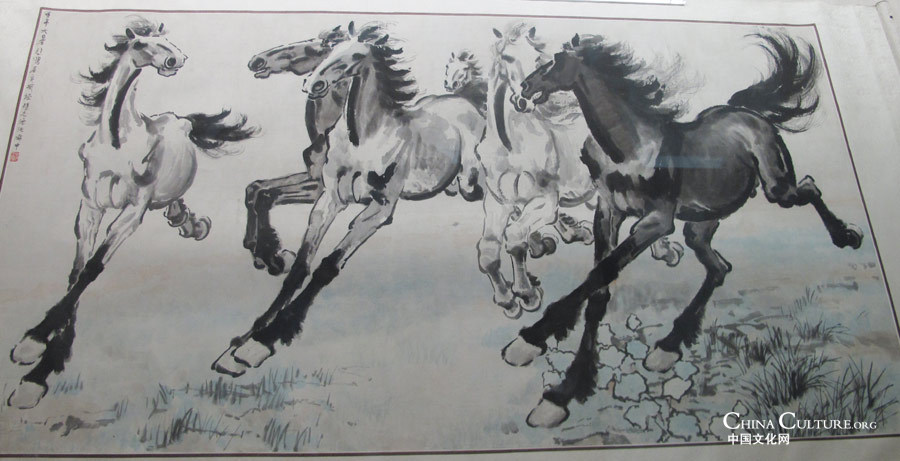
An ink painting titled Galloping Horse by Xu Beihong is on display at the exhibition Xu Beihong - A Master and His Masters, underway at the Henan Museum, in Zhengzhou, Henan province. [Photo/chinaculture.org/Yang Qi]
An exhibition, Xu Beihong - A Master and His Masters is underway at the Henan Museum, in Zhengzhou, Henan province. The exhibition opened Aug 14 and runs until Oct 19.
The exhibition displays over 100 pieces of art by Chinese art master Xu Beihong and art masters from the National School of Fine Arts in Paris.
The exhibition is part of the celebration marking the 50th anniversary of Sino-French ties. This is the exhibition's second stop in China. The next stop is Shanghai.
About Xu Beihong
Chinese painter Xu Beihong was primarily known for his shuimohua (Chinese ink paintings) of horses and birds. He was one of the first Chinese artists to articulate the need for artistic expressions that reflected a new modern China at the beginning of the 20th century. He was also regarded as one of the first to create monumental oil paintings with epic Chinese themes - a show of his high proficiency in an essential Western art technique.
Xu Beihong was a master of both oils and Chinese ink. Most of his works, however, were in the traditional Chinese style. In his effort to create a new form of national art, he combined Chinese brush and ink techniques with Western perspective and methods of composition. He integrated firm and bold brush strokes with the precise delineation of form. As an art teacher, he advocated the subordination of technique to artistic conception and emphasized the importance of the artist's experiences in life.
In 1933, Xu organized an exhibition of modern Chinese painting that traveled to France, Germany, Belgium, Italy, and the Soviet Union. During World War II, Xu traveled to Southeast Asia, holding exhibitions in Singapore and India. All the proceeds from these exhibitions went to Chinese people who were suffering as a result of the war.
Xu died of a stroke in 1953. After his death, a Xu Beihong Museum was established at his home in Beijing.
